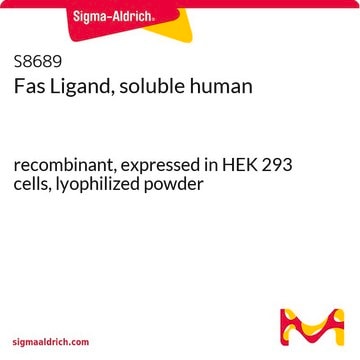PF033
Fas Ligand, Human, Recombinant
Fas Ligand, Human, Recombinant, consists of amino acids 103-281 fused at the N-terminus to a tag-linker peptide. Binds to human, rat, and mouse Fas.
Synonym(s):
CD95L, CD178
Sign Into View Organizational & Contract Pricing
All Photos(1)
About This Item
UNSPSC Code:
12352202
NACRES:
NA.77
Recommended Products
recombinant
expressed in HEK 293 cells
Quality Level
Assay
≥95% (SDS-PAGE)
form
lyophilized
potency
50 ng/mL ED50 (A20 cells)
does not contain
preservative
species reactivity
human, mouse, rat
manufacturer/tradename
Calbiochem®
storage condition
OK to freeze
impurities
<0.1 EU/μg Endotoxin (EU/μg purified protein)
shipped in
wet ice
storage temp.
−20°C
General description
Recombinant, human, Fas ligand consisting of amino acids 103-281 fused at the N-terminus to a tag-linker peptide. Binds to human, mouse, and rat Fas. The recombinant protein is produced in HEK293 cells. Useful for cytotoxicity assays.
Fas/APO1/CD95 (37-42 kDa), a member of the Tumor Necrosis Factor/Nerve Growth Factor (TNF/NGF) receptor family, is an apoptosis-signaling surface receptor known to trigger apoptotic cell death. Homology exists between the Fas and TNF receptors including a region called the "death domain" which is required to propagate the apoptotic signal. The signal activates a family of cysteine proteases, or caspases, which systematically lead to cell destruction. Genetic defects in the Fas system have been shown to lead to autoimmune disorders while increased activity or deregulation contributes to the pathology of diseases such as AIDS.
Fas/APO1/CD95 (37-42 kDa), a member of the Tumor Necrosis Factor/Nerve Growth Factor (TNF/NGF) receptor family, is an apoptosis-signaling surface receptor known to trigger apoptotic cell death. Homology exists between the Fas and TNF receptors including a region called the "death domain" which is required to propagate the apoptotic signal. The signal activates a family of cysteine proteases, or caspases, which systematically lead to cell destruction. Genetic defects in the Fas system have been shown to lead to autoimmune disorders while increased activity or deregulation contributes to the pathology of diseases such as AIDS.
Recombinant, human, Fas ligand consisting of amino acids 103-281 fused at the N-terminus to a tag-linker peptide. Binds to human, rat, and mouse Fas.The recombinant human soluble Fas ligand recognizes the Fas receptor in human, rat and mouse. Extracellular domain of human FasL, 103 - 281 fused at the N-terminus to a tag linker peptide.
Packaging
Please refer to vial label for lot-specific concentration.
Warning
Toxicity: Standard Handling (A)
Physical form
Lyophilized from PBS.
Reconstitution
Following reconstitution, aliquot and freeze (-20°C). Stock solutions are stable for up to 3 months at -20°C.
Reconstitute in 50 μl H₂O to yield a final stock concentration of 100 µg/ml. Further dilute in culture medium containing 5% FCS immediately prior to use.
Other Notes
Noguchi, K. et al. 1996. Oncogene13, 39.
Golstein, P. et al. 1995. Cell81, 185.
Katsikis, P. et al. 1995. J. Exp. Med.181, 2029.
Nagata, S. et al. 1995. Science267, 1449.
Thompson, C., 1995. Science267, 1456.
Watanabe-Fukunaga, R. et al. 1992. Nature356, 314.
Golstein, P. et al. 1995. Cell81, 185.
Katsikis, P. et al. 1995. J. Exp. Med.181, 2029.
Nagata, S. et al. 1995. Science267, 1449.
Thompson, C., 1995. Science267, 1456.
Watanabe-Fukunaga, R. et al. 1992. Nature356, 314.
The soluble Fas ligand kills APO-1/Fas-sensitive cells at a concentration of >50 ng/ml. For example, cell death results when 5 x 105 murine A20 B lymphoma cells are incubated with 50-500 ng/ml of the recombinant human soluble APO1/FasL (aa 103-281) for 16 h at 37°C.
Legal Information
CALBIOCHEM is a registered trademark of Merck KGaA, Darmstadt, Germany
Storage Class Code
11 - Combustible Solids
WGK
WGK 1
Certificates of Analysis (COA)
Search for Certificates of Analysis (COA) by entering the products Lot/Batch Number. Lot and Batch Numbers can be found on a product’s label following the words ‘Lot’ or ‘Batch’.
Already Own This Product?
Find documentation for the products that you have recently purchased in the Document Library.
Our team of scientists has experience in all areas of research including Life Science, Material Science, Chemical Synthesis, Chromatography, Analytical and many others.
Contact Technical Service






